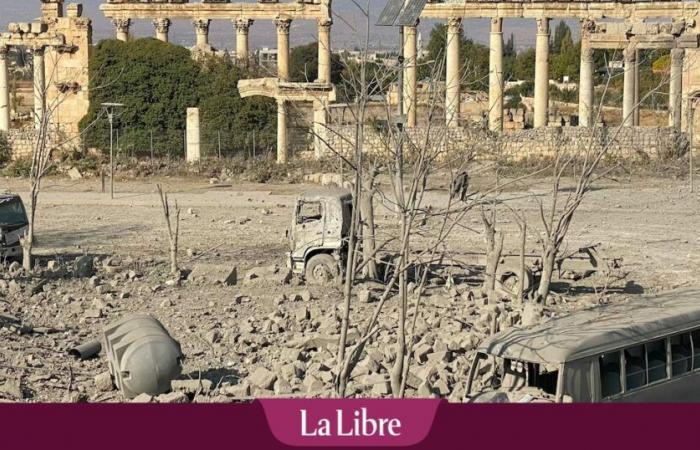
Around him, several dozen people silently scrutinize an edifying panorama: the day before, Wednesday November 6, while the day was slowly fading on the Bekaa plain – located on the eastern flank of the country – an Israeli missile crashed in one of the car parks of the UNESCO World Heritage site. Since then, the neighborhood has been trapped in a deluge of dust and rubble, giving the “city of the sun” a very sad monochrome face.
Who is Israel Katz, the new Israeli Defense Minister?
Dr Saad also came to see this scene of desolation. “We were at home, about a hundred meters from here, when an apocalyptic explosion shook the walls. It’s a double shock, because to that caused by the explosion, we must add a breaking point on the psychologically. There are no weapons or fighters, it is a sanctuary of peace and beauty. It is beyond comprehension, it is the treasure of Lebanon that has been attacked.he explains, also with a teary look in his eyes.
Because for the residents of Baalbeck, this place saturated with history and which houses Phoenician, Arab and Roman remains, was untouchable. Moreover, on October 30, when the Israeli army issued an evacuation order for the entire city, dozens of frightened residents rushed to the site to find refuge. .
“Collective punishment”
If the strike, which caused two civilian victims, did not cause visible damage to the remains, the concern is great, as explained by Bachir Khodr, governor of Baalbeck-Hermel. “The parking lot is part of the site, even if the ruins have not been directly affected, he explains. We are awaiting a visit from engineers and archaeologists in order to obtain a scientific report. The vibrations caused by the explosion may have damaged the structure of the remains, not to mention the smoke which degrades the stones.” In total on Wednesday, 30 strikes killed at least forty people in the city and its region.
In bombed eastern Lebanon, a detail marks: “This is the main difference with the 2006 war, and what puts Hezbollah in danger”
“The thousand-year-old temples of Baalbeck have withstood everything: looting, earthquakes, warsis indignant in turn, Moein, 30 years old. It is Lebanon that the Israelis are attacking, it is collective punishment, because there was no military target.” At his side, Mohammad, in his twenties, points to the Palmyra Hotel, built in 1874, whose facade was severely damaged by the strike: “How many big names have stayed here? Fairuz, Lawrence of Arabia, General de Gaulle… This story is ours, we all learn it when we are children.”
A concern that seems to grip an entire country: immediately, a hundred deputies sounded the alarm at UNESCO, urging the UN organization to protect all “invaluable sites currently under threat”. “For the first time in our lives, we see our heritage in danger, before our eyes, continues Governor Bachir Khodr. And we must remember that in recent wars, other historic sites have been badly damaged, notably in Iraq and Syria. There is an emergency.” If the latter assures that intense diplomatic work has been carried out for weeks, he believes that it is impossible to trust the Israelis. “Circuit walls dating from the French mandate were recently destroyed, the famous Menchiye building also, when it was empty, he says. They took the deliberate risk, by striking so close, of annihilating the ancient site of Baalbeck. It’s a new crime, this time against culture.”
“Body without head, without arms”
While, according to data provided by the authorities, more than 70% of Baalbeck’s residents have recently left the city, those who remain continue to endure the blows. A few hundred meters away, Fatma, 46, stands on the ruins of a building. With both arms bandaged, she said she had just left the hospital, after being injured by the impacts of broken glass following another Israeli strike. “My neighbors are dead, look, everything is destroyed, our lives are ruined, she explains, helplessly, her face marked by pain. We live in a poor neighborhood, not in a place of fighters. The house that my grandparents had built with their own hands collapsed. I don’t know where to go anymore.”
Migrants established in Lebanon also lost everything in Israeli strikes
Scenes which are repeated in many villages of the Bekaa plain, a territory historically favorable to Hezbollah, where those who remain seem pursued by death. In the shadow of a portrait of Nasrallah, in a town also targeted by a strike on November 6, Ali Tarchichi, a 52-year-old rescuer, is trying the impossible to save those who can be saved. He says he faces the insurmountable: “It’s terrifying, I found people whose bodies were cut up under the rubble, without heads, without arms.”
At the site of this other attack, which according to locals left 14 dead, including three children and six women, Abdallah Zineddine mourns his daughter. “There are only farmers in our village, why? We pay the price for not leaving and believing in the resistance? I have nothing left, but I’m staying here”he growls, standing on a mound of ruins, before screaming, drunk with anger, “Nasrallah, I am at your service!” Not far away, Hosni, 65, comments: “Human rights are a lie. Killing innocent people and razing houses will not eliminate resistance. On the contrary, it strengthens it.”





